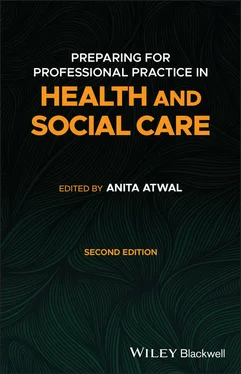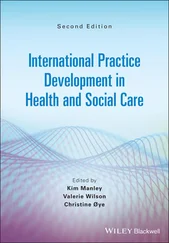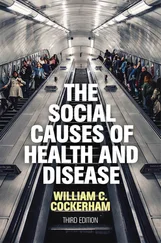Preparing for Professional Practice in Health and Social Care
Здесь есть возможность читать онлайн «Preparing for Professional Practice in Health and Social Care» — ознакомительный отрывок электронной книги совершенно бесплатно, а после прочтения отрывка купить полную версию. В некоторых случаях можно слушать аудио, скачать через торрент в формате fb2 и присутствует краткое содержание. Жанр: unrecognised, на английском языке. Описание произведения, (предисловие) а так же отзывы посетителей доступны на портале библиотеки ЛибКат.
- Название:Preparing for Professional Practice in Health and Social Care
- Автор:
- Жанр:
- Год:неизвестен
- ISBN:нет данных
- Рейтинг книги:3 / 5. Голосов: 1
-
Избранное:Добавить в избранное
- Отзывы:
-
Ваша оценка:
- 60
- 1
- 2
- 3
- 4
- 5
Preparing for Professional Practice in Health and Social Care: краткое содержание, описание и аннотация
Предлагаем к чтению аннотацию, описание, краткое содержание или предисловие (зависит от того, что написал сам автор книги «Preparing for Professional Practice in Health and Social Care»). Если вы не нашли необходимую информацию о книге — напишите в комментариях, мы постараемся отыскать её.
Preparing for Professional Practice in Health and Social Care
Preparing for Professional Practice in Health and Social Care
Preparing for Professional Practice in Health and Social Care — читать онлайн ознакомительный отрывок
Ниже представлен текст книги, разбитый по страницам. Система сохранения места последней прочитанной страницы, позволяет с удобством читать онлайн бесплатно книгу «Preparing for Professional Practice in Health and Social Care», без необходимости каждый раз заново искать на чём Вы остановились. Поставьте закладку, и сможете в любой момент перейти на страницу, на которой закончили чтение.
Интервал:
Закладка:
Reflection in Practice
Being a reflective Allied Health Practitioner is core to the successful implementation of quality interventions for the individuals and communities with whom we work. As outlined earlier in the chapter, EBP and clinical reasoning are interlinked and a key process for implementing change in practice is reflection. It is crucial that you are reflexive by reflecting on your idea of what you value as knowledge, and therefore becoming more aware of what you would recognise as having value to influence or amend your practice. Throughout this section, examples drawn from a range of health and social care professionals will highlight where EBP has been used to inform practice and move knowledge forward to improve the quality of service provision. Reflection is vital to uphold the standards of professional practice, and in most contexts essential for successful professional registration.
Critical Thinking Is Not Possible without Reflection
To use evidence to enhance your professional practice, you firstly need to see the need to review, change or develop practice, which requires reflection. Thinking critically to amend practice is a reflective process that requires the ability to critique evidence to make a judgement on the quality, and therefore value of, the evidence before considering how to put any changes into practice. Healthcare practitioners often jump straight to an action plan, taking little time to review or reflect again on whether the implementation of the action plan has enhanced practice through applying the knowledge gained. Core to this reflection are the views of key stakeholders whether that is patients, service users, colleagues, or managers. The reflexive element when engaging in reflection as part of EBP is often overlooked. Being a reflexive practitioner involves an individual considering whether their underlying beliefs and assumptions have been challenged or altered due to the critical engagement with evidence and observations of any change on practice.
Reflection and Reflexivity
Reflection and reflexivity are terms that are frequently used interchangeably although there are distinct differences. Reflection has been encouraged for several decades for practitioners within health and social care and is often defined as a process. It is viewed as fundamental to the professional development of health and social care practitioners and a core competency which has been essential during the COVID-19 pandemic (Walpola and Lucas 2021). Promoting and undertaking reflection ultimately seeks to ensure the quality of care provided for service users and should be undertaken by practitioners and managers (Stonehouse 2015). Reflexivity is a lesser understood term with roots in the philosophical underpinning of research. Self-reflexivity relates to exploring and highlighting your own values, particular biases, and preferences related to the research or topic area (Tracy 2010). As with researcher roles, health and social care practitioners can benefit from considering the influence of their own background and assumptions.
Often referred to as deep reflection, reflexivity has a stronger focus on exploration of values, assumptions, and beliefs that inform the professional practice provided. Being reflexive is essential in order to become more self-aware and to question further our actions, and the evidence we use, to inform clinical decision-making. A reflexive process involves an individual looking back and reflecting on themselves in order to emerge or move towards desirable professional practice (Johns 2017). Also, as a reflexive practitioner, it will not only increase self-awareness but also assist in identifying where there may be differing values underpinning other professionals’ actions. Increasing awareness of this can assist with group reflection and explain where differing assumptions may inform clinical reasoning and different approaches to practice.
Case Study 1 – Interprofessional Collaboration: Differing Assumptions Informing Ideas
When working with younger people with dementia, and their caregivers, an occupational therapist and a mental-health nurse reflected on how any service development should evolve. Both healthcare practitioners were passionate about providing a quality service and shared core values of respect, dignity, and compassion. Through reviewing the evidence base, of which there was little at this time, and speaking with the service users regarding their preferences, it became apparent that their own assumptions and clinical reasoning differed regarding the relevant type of setting for the service. Although both professionals were motivated to create a quality service, without taking time to engage with stakeholders and reflect on their own values and assumptions, the service developments could have gone in the wrong direction. An initial idea of an inpatient service changed, through joint reflection, to community based, flexible services for the individuals living with dementia and their caregivers.
Reflection Is Not Only an Individual Act
Reflection requires knowledge, skills, and an attitude to be open to changing professional practice. For several decades there has been access to models of reflection, practical tools, and questions that prompt reflection that focuses on the individual level with inconsistency in how these tools are used. There are also growing ranges of tools available for quality improvement within health and social care that encourage an element of reflection although this is not always explicit in the structure. The Plan, Do, Study, Act (PDSA) cycle (Taylor et al. 2014) has reflection within the study phase and this is used widely in healthcare improvement (see Chapter 5). As reflection is key to all health and social care practitioners’ standards for practice, it is essential to view reflection as integrated within ‘daily’ practice rather than being perceived as an exercise only completed in pre- or post-graduate education or as an extra task only completed to pass any professional standards as a tick box exercise. It is also important to consider reflection as being beyond an activity only undertaken individually in isolation, but as core to the supervision process. Reflection is valuable when undertaken with peers, in teams, and with colleagues from a mixture of professional grades and backgrounds. The ultimate aim would be to also consider reflection inclusive of service users to truly bring together the core tenets of EBP. This will refine clinical reasoning and can add to the evidence base through informing future practice.
Reflective Models, Settings, and Tools
Being reflexive is essential for the advancement of professional practice. As is ever apparent with key national and international events, health and social care practitioners are having to demonstrate that they are capable of applying competencies and EBP in ever changing, complex, and often unfamiliar contexts. Individuals need to feel empowered to reflect on and question their own practice and the clinical reasoning of others, so that critical problem solving can lead to positive change for the wider community.
There are a wide range of models and tools available to practitioners to promote reflection. From the early work by Schön (1987) that highlighted both reflection in action and on action, based on the reflection of designers, an array of models have evolved for application in health and social care. Reflection-in-action occurs in the moment, whereas reflection-on-action occurs after the event and evaluates the situation through a staged process. The challenge is seeking practical strategies that push you further with your reflection to becoming reflexive, as well as being helpful to generate positive change within your profession and work context.
Читать дальшеИнтервал:
Закладка:
Похожие книги на «Preparing for Professional Practice in Health and Social Care»
Представляем Вашему вниманию похожие книги на «Preparing for Professional Practice in Health and Social Care» списком для выбора. Мы отобрали схожую по названию и смыслу литературу в надежде предоставить читателям больше вариантов отыскать новые, интересные, ещё непрочитанные произведения.
Обсуждение, отзывы о книге «Preparing for Professional Practice in Health and Social Care» и просто собственные мнения читателей. Оставьте ваши комментарии, напишите, что Вы думаете о произведении, его смысле или главных героях. Укажите что конкретно понравилось, а что нет, и почему Вы так считаете.












